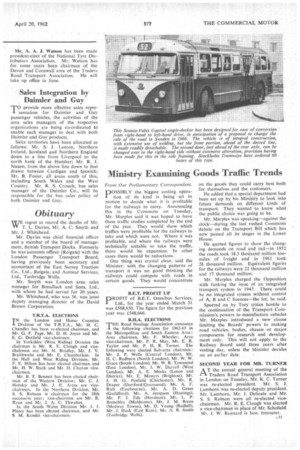Ministry Examining Goods Traffic Trends
Page 33

If you've noticed an error in this article please click here to report it so we can fix it.
FromOur Parliamentary Correspondent.
POSSIBLY the biggest costing operation of its kind is being set in motion to decide what it is profitable for the railways to carry. Announcing this in the Commons on Tuesday, Mr. Marples said it was hoped to have these traffic studies completed by the end of the year. They would show which traffics were profitable for the railways to take and which were not. Where it was profitable, and where the railways were technically suitable to take the traffic, there would be expansion. In other cases there would be reductions. .
One thing was crystal clear, said the Minister: with the changing patterns of transport it was no good thinking the railways could compete with roads in certain goods. They would concentrate
on the goods they could carry best both for themselves and the customers.
He added that a special department had been set up by his Ministry to look into future demands on different kinds of transport. They wanted to know what the public choice was going to be.
Mr. Marples was speaking—against the clock—during the last rushed Commons debate on the Transport Bill which has now passed all its stages in the Lower House.
He quoted figures to show the changing demands on road and rail—in 1952, the roads took 18.3 thotisand million tonmiles of freight and in 1961 took 28 thousand million. Equivalent figures for the railways were 22 thousand million and 17 thousand million.
Mr. Marples charged the Opposition with funking the issue of an: integrated transport system in 1947. There could be no integrated system without control of A, B and C licences—the lot, he said.
Spurred on by Tory critics hostile to the continuation of the Transport Commission's, powers to manufacture vehicles Mr. Marples introduced a new clause limiting the Boards' powers to making road vehicles, bodies, chassis or major components for research and development only. This will not apply to the Railway Board until three years after vesting day, unless the Minister decides on an earlier date.
SECOND YEAR FOR MR. TURNER AT the annual general meeting of the Traders Road Transport Association in London on Tuesday, Mr. K. C. Turner was re-elected president. Mr. S. J. Lamborn was re-elected deputy president. Mr. Lamborn, Mr. J. Delicate and Mr. S. S. Robson were all re-elected vicechairmen. " Mr. R. E. Cough was elected a vice-chairman in place of Mr. Schofield. Mr. J. W. Bannard is hon. treasurer.
















































































































